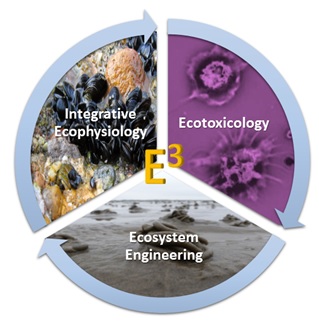Current projects and research topics
The Department of Mariner Biology pursues work in my laboratory is integrative, using approaches including physiology, genomics, and population genetics to understand the physiological adaptations that allow animals to live in particular environments.
The research of Marine Biology aims to understand the adaptations of marine organisms to their environments and to predict the effects of natural and anthropogenic perturbations on marine ecosystems. Towards this goal, we pursue three interconnected research foci (E3):
Integrative EcophysiologyandEcotoxicology focuses on the effects of multiple stressors (hypoxia, temperature, salinity, ocean acidification and pollution) on marine organisms. We use an integrative framework including physiology, molecular biology and ecology to link molecular and cellular responses to multiple stressors to the organismal phenotype and fitness and to the population- and ecosystem-level consequences of these stressors. We use biomarker-based approaches and bioenergetics as a tool to integrate and assess the effects of multiple stressors on marine organisms. We are also interested in physiological adaptations of marine organisms to extreme environments such as the intertidal zone, coastal hypoxic areas or oxygen minimum zones.
Ecosystem Engineering studies the effects of environmental factors on ecosystem functions (such as bioturbation, bioirrigation, and filter feeding) of keystone benthic species and on animal-sediment interactions. We also investigate the effects of environmental stressors on the structure and function of benthic communities.
Our group broadly collaborates with the national and international partners across Europe, USA, Ukraine and Russia. We are interested in developing new collaborations and invite anyone interested in our research to contact us.

